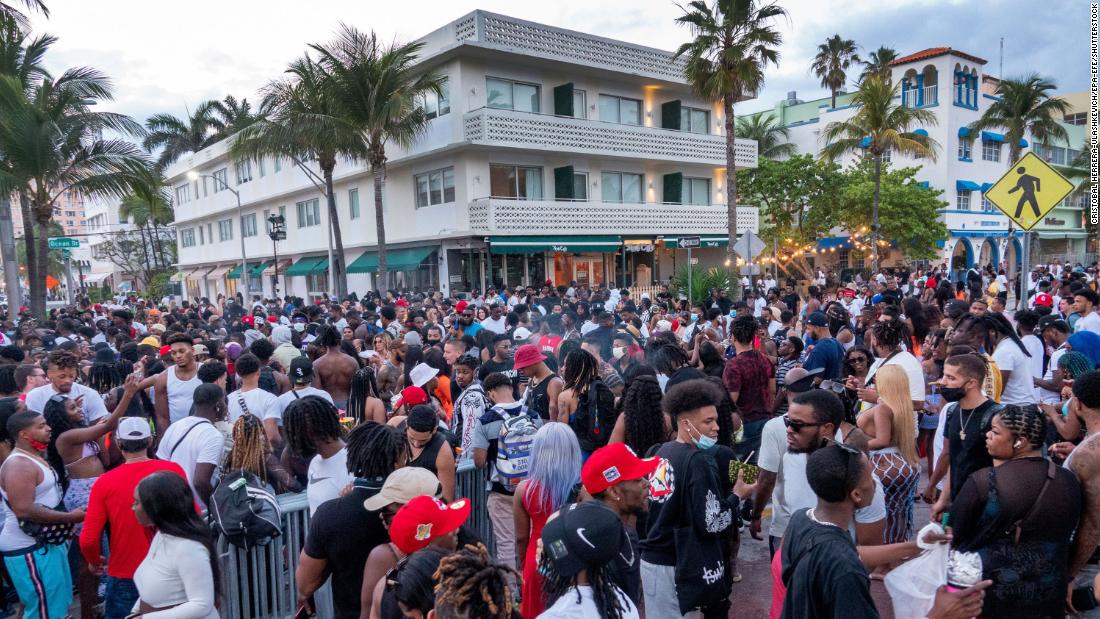Images from the region offer little hint a deadly virus is still running rampant in the country
“I don’t see anyone taking any precautions, whatsoever,” Pena, 32, told CNN. “No one’s wearing masks, no one’s social distancing.”
Images from South Florida’s spring break season offer little hint a deadly virus is still running rampant in the country. In the past week, there was an average of about 54,600 new cases and more than 1,000 virus-related deaths reported every day in the US, according to Johns Hopkins University data.
“You see those pictures of people crowded into bars, for example, especially indoors, no masks, basically no physical distancing,” Cindy Prins, an epidemiologist at the University of Florida said. “That just creates an unfortunately ideal situation for transmission of Covid.”
And the crowds show little sign of thinning out, with the Miami Beach police chief saying visitors have multiplied in recent weeks — and the trend will likely continue through into April.
Pena isn’t just worried about catching the virus herself. Like local officials and experts, she says she worries the crowds could lead to further spikes and devastation across her community and the country — which she experienced first-hand when she lost her grandmother to the virus in October.
“I’m scared of more deaths, just like I have witnessed and been part of the casualties of Covid,” she said. “We’re losing people left and right, because of the carelessness and inconsideration.”
South Florida residents CNN spoke to expressed the same concern, adding they understand government leaders’ tough decisions as they try to balance the desire for a healthy economy against the safety of a community. But, several residents said, they wish the state welcomed visitors in a safer manner, with tighter enforcement for rule-breakers.

People enjoy themselves along Ocean Drive on March 19, 2021 in Miami Beach, Florida
Joe Raedle/Getty Images
‘It does not look good’
Emily Arcia, who lives in Miami, said for months she left the house only when absolutely necessary, taking only outdoor walks with her husband by the beach — and only after gearing up with masks and gloves.
While she’s been fully vaccinated, her husband just received his first shot, and going outside — especially now — makes the pair nervous again.
“I live right in front of the ocean, I live right next to a park and it’s packed,” Arcia, 66, said. “I don’t even go downstairs Saturdays and Sundays, because there’s just too many people.”
During the times when Covid-19 cases surged in the community, she would hear the sirens of first responders from her balcony — at a rate much more frequent than normal. It’s a marker she dreads will come around again.
“I have no idea what can be done to prevent what I think is going to be a spike in cases,” she said. “I’m hoping that the number of vaccines that are being… provided, will sort of balance that somehow. But, you know, it does not look good.”
And it’s not just the state that could see consequences.
“It’s not just about what will happen in Florida,” says emergency physician Dr. Leana Wen. “It’s about what will happen when people return to wherever they came from and then become asymptomatic carriers who could transmit the virus to other vulnerable people.”
The returning spring breakers, she says, could fuel surges all across the country.

A large crowd of people participate in a party on a walkway near the beach, during spring break in Miami Beach on March 20, 2021
Cristobal Herrera-Ulashkevich/EPA-EFE/Shutterstock
Local leaders fear for progress lost

A general view of people partying at the Elbo Room on Fort Lauderdale Beach on March 14, 2021
Larry Marano/Shutterstock
“We’ve spent a lot of time and energy and gotten all of our major indicators down,” Miami Mayor Francis Suarez told CNN on Thursday. “Obviously spring break brings a flood of tourists and they may not be thinking as conscientiously as the people who stay here and have to deal with the repercussions later.”
Gelber, in Miami Beach, is also fearful. “We have too many people coming who want to just let loose in ways that are unacceptable, and we have a pandemic, including, I think, really, ground central for the variant,” he said recently.
And experts, including Wen, have warned that as high levels of infection persist while the country works to vaccinate more Americans, it’s more likely the virus will continue to mutate and more concerning variants could arise, which could not only be more transmissible — but also pose a problem for vaccines.
“So the more community spread there is, the more these variants could develop and that could really set us back,” Wen said.
CNN’s Travis Caldwell contributed to this report.
![]()


